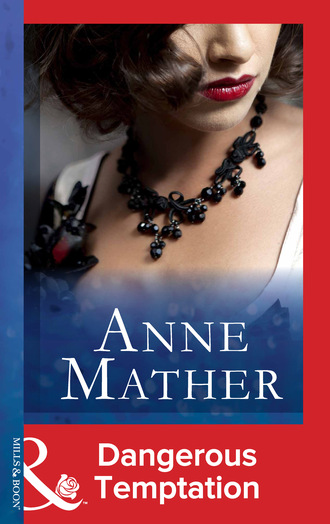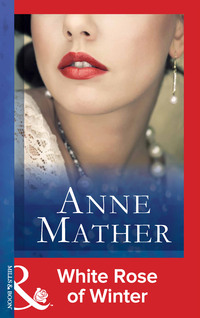
Полная версия
Dangerous Temptation
“That’s right.” Harper looked both harassed and weary. “Come with me, please, Mrs Wolfe. I’ll explain why I wanted to speak to you before you see your husband.”
“Good luck.”
Emmy’s mother called the words after her as Caitlin followed the stoop-shouldered medic into the corridor, and she raised a grateful hand. She had the feeling she was going to need all the luck she could get if Dr Harper’s expression was anything to go by.
The corridors were still busy, with orderlies transferring patients from one ward to another. Although she tried not to look at all the gurneys they passed, the need to reassure herself that Nathan wasn’t on one of them was irresistible. But none of the pale faces she saw even remotely resembled her husband. Wherever Nathan was, she was not to be allowed to see him until this unsmiling doctor had delivered his doubtful news.
The office he eventually appropriated was obviously not his own. A nurse, who had apparently been snatching a quick cigarette, was unceremoniously despatched, and Dr Harper opened a window to allow the noxious fumes to disperse. It allowed a draught of cold air to enter the office, however, and Caitlin blamed that for the sudden chill that slid down her spine.
“Please—sit down.”
Harper gestured to a chair beside the desk, and although Caitlin would have preferred to stand, she obediently complied. The truth was, she felt less helpless when she was standing. As if whatever blow she was going to be expected to weather could be overcome better when she was on her feet.
“Thank you.”
Her gratitude was as spurious as the tight smile she bestowed on her companion, and the doctor hesitated only a moment before seating himself behind the desk. It occurred to Caitlin then that he probably welcomed the respite. He wasn’t a young man, and he’d obviously been continually on his feet throughout the night.
“You’re English, Mrs Wolfe,” he remarked at last, unnecessarily, Caitlin felt, but she assumed it was his way of starting the interview. Whatever he had to say, it was probably easier to get the formalities over first. Hospitals had their own form of protocol, even in circumstances like these.
“Yes,” she replied now, crossing her legs and making sure the skirt of her coat covered her trembling knees. “I flew over from London this morning.”
“This morning?”
Harper arched a quizzical brow, and Caitlin felt obliged to explain. “On the Concorde,” she appended quickly. “I was lucky enough to get a cancellation.”
“Ah.” He inclined his bead. “Your husband’s not English, of course.”
Caitlin began to understand.
“No,” she said evenly. “Nathan was born in this country. As a matter of fact, he was over here visiting his—oh, God!” She broke off as a horrifying thought occurred to her. “Has—has anyone informed Nathan’s father? If he knew his son was on the flight, he must be worried sick. And he’s not a well man—at least, that’s what Nathan said.”
“We only inform next of kin,” replied Dr Harper flatly. “Right now, I’m more concerned with the after-effects of your husband’s injuries. I have to warn you, Mrs Wolfe, there’s a problem. He probably won’t remember who you are.”
Caitlin’s jaw sagged. She had barely recovered from the shock of learning that she was going to have to break the news to Nathan’s father, a man whom she’d never even met, and Dr Harper’s words left her weak.
“I beg your pardon,” she began, her mouth dry and taut with tension, and the doctor attempted to explain what he had meant.
“It’s quite common, really,” he told her, though Caitlin was equally sure it was not common at all. “Your husband is suffering the effects of being involved in a serious—not to say, traumatic—accident. In many cases of this kind, a temporary neurosis can occur.”
“You mean—there’s some psychological problem?”
“I mean that anyone involved in such a situation can conceivably suffer some kind of mental block.”
“Mental block?”
“Mrs Wolfe.” He was obviously trying to be patient, but he’d dealt with a lot of anxious relatives already that morning, and he was tired. “Your husband appears—I say, appears—to be quite normal. He has one or two minor injuries—cuts and bruises, that sort of thing—and when he was admitted, he was suspected of having a couple of cracked ribs and a dislocated shoulder.” He paused. “All of which have been dealt with. He’s in a state of shock, of course, and I wouldn’t say he was fit to travel. But compared to some of the other—passengers—I’ve seen, he’s in fairly good shape.”
“But …?”
Caitlin sensed there was more, something the doctor wasn’t telling her, and Harper gave her a weary look before continuing with his diagnosis.
“But,” he agreed with a sigh, “he can’t remember anything.”
“About the accident? But surely—”
“Before the accident, and the accident itself,” Harper interrupted her heavily. “It may be a temporary condition as I say. It’s too soon to tell, and often the victims of car crashes, explosions, that sort of thing, suffer a short-lived amnesia. That may well be all we have to deal with here. But with head injuries, anything is possible.”
Caitlin swallowed. “You didn’t mention he’d injured his head.”
“Because he hasn’t,” declared Harper levelly. “Unless you count the bruise we found on his temple. We’ve done a scan, and we’ve found no internal bleeding. Nothing that might be causing pressure on his brain.”
“Then—”
“Mrs Wolfe, what can I tell you? For the present, there’s nothing more to be done. You must be prepared for him not to recognise you, that’s all. That’s why I wanted to speak to you before you saw him. I don’t want you to upset him. I just wanted you to know what to expect.”
3
He had the most God-awful headache. There were times when it felt as if there was an army of blacksmiths hammering away inside his skull. Just moving his head on the pillow sent a spasm of pain spiralling to his brain. A brain, which he had to admit felt like mashed banana, and just about as much use to him besides.
At least he still appeared to be in one piece. He might have a stinking headache, but his brain was still functioning, albeit at half power. Some of the poor devils in the beds around him didn’t even know which day it was. And the head injuries one of his fellow patients had sustained made him feel quite weak.
Well, weaker than he did already, he amended wryly, aware that right at this moment, he couldn’t have punched his way out of a paper bag. Dammit, even his legs felt like jelly. And although they’d assured him it was just delayed shock, he couldn’t seem to stop shaking.
It must have been one hell of a mess, he thought, not envying the fire crews and paramedics who had had to deal with the aftermath of the crash. Bodies everywhere, most of them well beyond the help of anyone in this world. And the screams—oh, God!—he could remember them. He doubted he’d ever get them out of his head.
Which was strange when so much else was gone. He didn’t remember getting on the plane. He didn’t even remember where he had been going. But most disturbing of all, he didn’t remember his name, or any damn thing about himself.
He didn’t remember the actual crash, either—just the horror of finding himself on the ground, surrounded by the cries of injured people. Someone had told him, he didn’t remember who, that he’d been thrown clear when the plane ploughed into the end of the runway. By some uncanny quirk of fate, the fuselage had fractured near his seat, and he’d been pitched onto the grass verge that edged the tarmac.
He remembered the smell—a sickening odour of kerosene—and the searing heat of the ball of fire that had consumed what was left of the aircraft. He knew that more people had died, engulfed by the flames, while he’d lain there unable to do anything.
They said he’d been knocked unconscious, which accounted for his memory loss now. He just wished he could have forgotten the aftermath of the crash. At present, it was the only thing on his mind.
Yet, if he concentrated, he could remember superficial things. It caused the throbbing in his head to increase, but he knew the name of the president who was presently occupying the White House, and he was pretty sure he could still read and write. For instance, those blacksmiths who were taking his skull apart had to come from somewhere. And no one had had to tell him where he was.
Or was that strictly true? Had he really known he was in a hospital in New York? He frowned. So, okay, someone had told him that, but he’d known what a hospital was, and he’d known what was happening after the crash.
The hammering was worse, much worse, and his mouth felt as dry as a dust bowl. Probably tasted like one, as well, he thought ruefully, wishing he could call a nurse. The injection they had given him earlier to relieve the pain must have worn off.
He closed his eyes for a moment, and when he opened them again, a face swam into view. A female face, oval shaped and somehow vulnerable, it was gazing at him rather uncertainly. As if the woman didn’t quite believe he was alive, he mused, forcing himself to concentrate on who she was. She was nothing like the nurse who’d attended him earlier, who’d scolded him for trying to get out of bed. Just because he’d wanted to go to the bathroom instead of using one of their damn bedpans. Dammit, he might have lost his memory, but he still had some pride.
He wondered briefly if he’d died and gone to heaven. The way his head had been hammering earlier, there was always a chance. And surely only an angel could have eyes that vivid shade of sapphire. Or were they violet? he pondered dazedly as a sooty fringe of lashes swept her cheeks.
He licked his lips, but whatever romantic words had formed in his mind, his outburst was hopelessly prosaic. “A drink,” he whispered, giving in to the urgent needs of the moment. “I need a drink. I’m parched.”
Every word caused the pain in his skull to expand, and her timid “What?” had him groaning for relief. Dammit, what was the matter with her? Was he speaking a foreign language? Why was she gazing at him with those big blue eyes, as if he’d scared her half to death?
“Oh—water,” she eventually stuttered faintly. And now he heard the unfamiliar inflection in her voice. “I didn’t think—I didn’t realise—you want a drink?” She glanced around. “I’ll get the nurse. Just hang on a minute.”
“No,” he began as she would have moved away, and although he sensed her reluctance to obey him, she stayed where she was. “There,” he croaked, “on the cupboard.” And she turned to look at the carafe of water and the glass.
It was her accent, he realised as she poured a little of the water into the glass, dropped in a straw, and slid a slim arm beneath his shoulders. It was different, unfamiliar—English? Yes, that was it. He would almost swear it was English So—he knew her accent, but he didn’t know who she was.
A drifting cloud of fragrance enveloped him as she lifted him. And her breath, as she murmured, “Are you sure this is all right?” was just as sweet. Perfume, he breathed; nurses didn’t usually use expensive perfume. Or wear fur-trimmed overcoats besides, he thought as the softness of her sleeve brushed his neck.
He was so bemused by what his senses were telling him that when she brought the straw to his lips, he felt some of the water go sliding down his chin. Oh, great, he thought, he was dribbling like a baby. What an impression he was going to make.
Nevertheless, the drop of water that made it past his lips was refreshing. The straw was only plastic like the glass, and the liquid had a faint metallic taste, but it felt like liquid honey on his tongue. It eased the awful dryness that was almost choking him, and although his head was still throbbing, the woman’s appearance had distracted him from his woes.
When she lowered him back to the pillow, he groped blindly for her hand. “Who are you?” he demanded, hearing his voice, hoarse and anxious in his panic. He gripped her wrist, feeling the narrow bones taut, and somehow fragile, beneath his fingers. “You’re not a nurse,” he stated with more conviction. “Nurses don’t dress—or smell—the way you do.”
She hesitated. “Don’t they?”
“No.” He frowned. “I guess I should know you, right? We have—we have met before?”
“You don’t remember?”
“If I did, I wouldn’t be asking.”
He sighed. That was stupid. He had to calm down. Getting angry with her wasn’t going to achieve anything. She was here because she was concerned about him, not to listen to his griping. It wasn’t her fault that the damn plane had crashed.
“If—if they let you in to see me, you must be a relation,” he ventured steadily. He expelled his breath in frustration. “I can’t remember.”
She licked her lips now, her tongue appearing almost hypnotically to lave her upper lip. Its tip, pink and provocative, was mesmerising. It reminded him that his emotions hadn’t been paralysed by the crash, and he let go of her wrist, not wanting her to recognise his reaction. For God’s sake, the woman could be his sister, though he sensed with a kind of gut feeling that she wasn’t.
“You don’t remember—anything?” she asked at last, clearly as dismayed by the circumstances as he was himself. And, although he had no reason to think so, he sensed that it alarmed her. So their relationship was not as simple as he’d like to think.
Yet why wouldn’t she be alarmed to hear he was virtually a stranger? He was someone who couldn’t even tell her why she was here. It must have been a shock. Hell! It was something more than that to him. But he still had the feeling there was something she was trying to hide.
“Nothing—personal,” he replied at last, his headache rapidly overtaking his will to speak to her. He was too weak to play word games, and he half wished she would go. That surge of sexual attraction had all but dissipated, and he just felt tired. Deathly tired, actually. He could hardly keep his eyes open.
She was still watching him, warily, he thought, his imagination refusing to give in. He guessed she was trying to decide whether she believed him or not, and that was strange. Why would she think he might lie? What might he have done to make his answer seem so untenable? In the present circumstances, she must surely realise his limitations. For Christ’s sake, he was lucky to be alive.
Or not …
“You don’t remember going to see your father?” she ventured, and it was a great temptation to yell that he didn’t know who the hell his father was. But at least she’d supplied another piece of the jigsaw. He had a father, if no one else. He wasn’t completely alone.
“No,” he sighed, finding the strength to answer her somehow. “Believe it or not, I didn’t know I had a father until you said so. Or—a girlfriend, either,” he added weakly. “Perhaps if you told me your name …?”
Her lips parted. “I’m not your girlfriend!”
Her denial was absolute, and his hands curled helplessly into fists. For God’s sake, she couldn’t be his sister! He recoiled from that solution with a tortured breath.
“Then who…?” he began, but the effort defeated him. Behind his eyes, the darkness was rising, albeit against his will. With a sense of shame, he felt his senses slipping. The woman, whoever she was, dissolved.
When he opened his eyes again, it was evening. He knew it was evening because the long blinds had been lowered over the windows in the wall opposite, and there were lamps glowing all about the ward. It was strange how in such a short time the place had become familiar. But—God!—it was the only point of contact that he had.
His head wasn’t aching quite so badly now. Even when he moved his head on the pillow, he didn’t get the awful hammering he’d had before. The shaking in his limbs had receded to an occasional spasm, and he actually felt as if he might be able to sit up.
He could smell food and he wondered what time it was. Early evening, he surmised, judging by the muted activity in the ward. They’d be serving supper soon, and then they’d allow the patients to have visitors. At least, that’s what he seemed to remember had happened the night before.
His lips twisted at the word: remember. It was ironic, really, how some things seemed so clear. Like the night before, when he’d been transferred to this bed, and they’d been serving chicken soup for supper. He wondered what it would be tonight and if he’d be allowed to eat.
He closed his eyes for a moment as if to test his powers of perception. Yes, opening them again was definitely not the effort it had been. Last night, he’d felt as helpless as a baby. Which was silly, really, when he hadn’t been badly hurt.
He closed his eyes again, and this time the image of the woman he had seen earlier that day swam into his vision. Her vivid gaze seemed so real that he opened his eyes once more, half-convinced he’d find her sitting beside his bed. But there was no one near him; the activity of the ward went on around him. Had she really existed? he wondered, or had he dreamt the whole thing?
He shifted restlessly, and a drift of perfume brushed his consciousness. She’d been wearing perfume, he remembered. He’d noticed it when she’d put her arm around him and lifted the glass of water to his lips. The scent of her must have lingered on his pillow. So, she hadn’t been a dream; she’d actually been there.
Such a distinctive fragrance, he reflected, luxuriating in the memory. Cool and somehow innocent, yet purely sensual in its appeal. He knew instinctively it was the kind of perfume he liked to smell on a woman, and he briefly entertained the thought that she’d worn it just for him.
Yet when he’d suggested she might be his girlfriend, she’d been so affronted. As if the idea was too ridiculous to be borne. So—what? If not his sister, could she be his—wife? Dear God, he thought, if that were so, surely he would have known.
Or would he? Excitement stirred. The idea that he might be married to the beautiful creature who’d leant so confidently over his bed was tantalising. And it was an idea that, once having taken root, was hard to shift. Was that why she’d hurried to his bedside? And was she nervous because they’d had some altercation before he left?
But he’d been going to England, he reminded himself uneasily. And she hadn’t been with him, so far as he knew. No, she couldn’t have, to be so calm and collected. So had he been going to see her? Did they live apart?
She was English. He remembered that. Or if not English, then she’d lived there for some considerable time. God, if only he knew what had caused their separation. He knew so very little about himself.
As another thought struck him, he lifted his left hand and examined his third finger. But there was no ring—not even a sign that one had been there. But that meant nothing, he told himself fiercely. Not all men wore wedding rings. He frowned. Had she?
Refusing to let the insidious waves of panic scramble his already tortured senses, he made an intense effort to remember everything he knew about her. As if she were part of some imagined identity parade, he summoned up her image. Blue eyes simply weren’t enough. He needed to recall her face in intimate detail.
But the features he forced back into focus were no more familiar now than they had ever been, and the knowledge that he could meet someone from his past without feeling any sense of identification almost frightened him to death. She’d known his father, he reminded himself desperately, which meant she had a part in his life. But what part? And for how long? And where was his father? The questions scared him more each time he struck out.
Panic almost overwhelmed him. He could smell the cold sweat that had broken out all over his useless body. Fighting it back, he struggled to find something to hold on to. But terror had him firmly in its grip.
Christ, what would he do if he never regained his memory? If the black hole he called a brain refused to work? What did people do in circumstances like this? Did they all feel so helpless? God, he thought, he’d have given anything for a shot of a single malt.
He blinked rapidly, feeling the incipient twinges of the headache he seemed to have had forever gnawing at his temple. It seemed as if whatever way he turned there was no relief. Dammit, he wasn’t a chicken; he had to overcome this. But for someone who seldom got headaches in the normal way, it was draining his strength.
He swallowed. Now, how had he known that? he wondered shakily, clinging to the thought like the proverbial drowning man. How did he know he wasn’t a slave to migraines, or suffer hangovers whenever he drank? And he did enjoy a drink; he was fairly certain. Oh, Lord, was his memory slowly coming back into life?
Afraid to explore something that still seemed so fragile, he turned his attention to what he had been trying to do before. With a determined effort, he forced the woman’s face back into his consciousness. She must hold the key, if he could only remember what it was.
Her face seemed familiar now, but he knew that was just an aberration. Because he’d been concentrating on her image for so long, it had acquired a recognisable shape. But he didn’t doubt that she was real; that she existed. He knew her, and that had to be a plus.
He breathed heavily. She’d had light brown hair, he decided, recalling the silky strands that had brushed his collar. Sort of toffee-coloured, he amended, and streaked with butter. Like caramel and cream or corn and coffee. He delighted in the comparisons. And just as smooth.
As far as her face was concerned, that was harder. It was oval, yet she’d had quite a determined chin. Her cheekbones had been high, her cheeks streaked with colour; and she’d had a mouth that he’d badly wanted to kiss.
Ridiculous!
He dispatched the thought instantly, drawing in another unsteady breath. It was no use speculating about their relationship. Until she told him who she was, it was far too dangerous to permit.
Once again he forced back the frightening void that loomed in front of him. He had to stop being so negative about his condition. That doctor—Harper—had said there was no easy answer. It would take days or weeks or months to recover completely.
Or never…
Of course, it was easy for a doctor to say. He didn’t have to live with this terrible emptiness, this lack of knowledge that threatened to drive him mad. He didn’t have to wake up to an awareness that was only partial. He didn’t know his name, his age, his identity. He didn’t have a life.
The brief spurt of optimism he’d been feeling while he was recalling the woman’s image faded. There was no point in pretending he was getting anywhere with that. She was just as much a stranger now as she had ever been. Beautiful, yes, but anonymous just the same.
Which surely proved that their relationship couldn’t be an intimate one, he decided wearily. And, looking back, she had shown little joy in finding he was alive. If his opinion meant anything, she’d seemed to look at him almost critically. As if she was searching for some recognition she hadn’t found.
But that way lay danger. He refused to allow himself to approach the abyss again. She had to know who he was. Why else had she come here? The name—his name—Nathan Wolfe, had meant something to her.
A draught of air cooled his throbbing temples, but when he opened his eyes it was to find a nurse lifting the clipboard from the end of his bed. On it, he knew, were all the details of his present condition. They kept a note of his temperature, his blood pressure and his pulse.
And what else? he wondered. Judging by the way he was sweating at the moment, his temperature was probably way over par. He had only to think of how helpless he was, and his heart started pounding. The symptoms might be physical, but he knew it was mostly due to nerves.
“How are we feeling?” the nurse asked cheerfully, treating him to a gap-toothed smile. Haynes, he thought, frowning. Her name was Nurse Haynes. She’d been on duty last night when he was admitted. Only then he’d barely acknowledged she was there.









